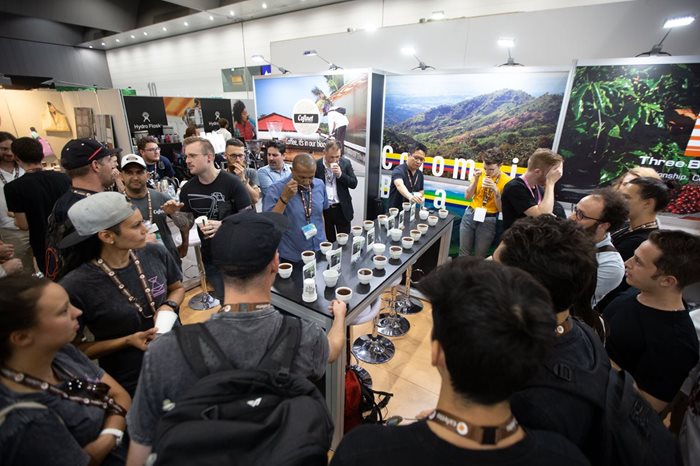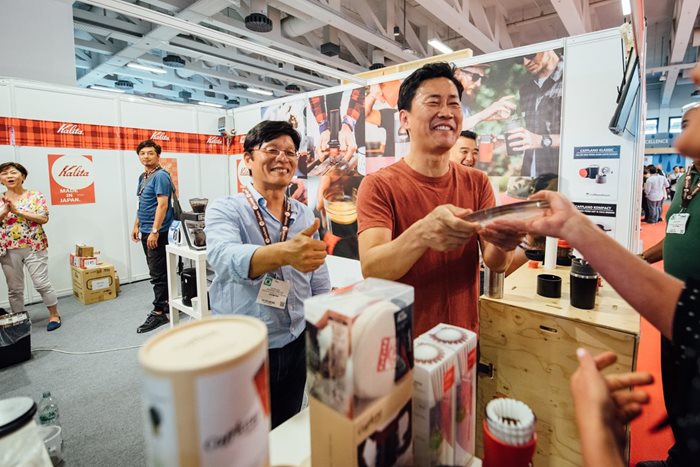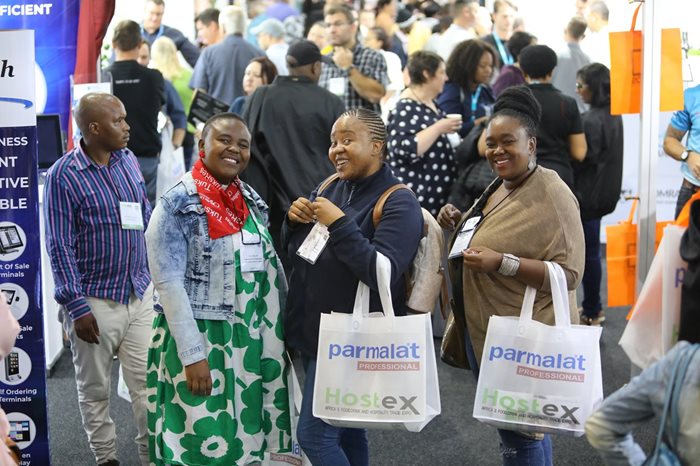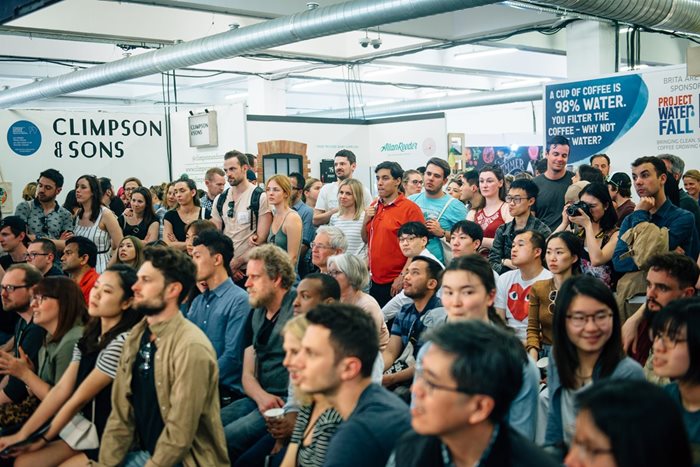For hospitality businesses around the world, coffee events are crucial opportunities to showcase the latest products and innovation, engage with new audiences and network with like-minded individuals. Iain Evans and Melanie Winter spoke with key global coffee events organisers to find out how the industry can adapt and survive in a socially distanced world
.jpg.aspx?lang=en-GB&width=700&height=467)
An aerial view of the SCA Expo 2019 in Boston showing just a fraction of the total floor space used | Photo: SCA/World of Coffee
The entire world is reeling from the devastating effects of Covid-19. Socially, politically, economically – unprecedented events have unfolded in just a few short months. On 20 April, just over a month after Covid-19 was declared a global pandemic, oil futures fell to zero before plummeting to an historic low of -$37.63 per barrel.
Every major sporting league, tournament and competition has been postponed, including the most prestigious of them all – the Summer Olympics – due to be held in Tokyo in July 2020, but pushed back by a year as the world waits for the pandemic to diminish.
Perhaps most damaging of all, people have been restricted from physically interacting with each other as gatherings have been banned and events are cancelled outright. From Wuhan to Milan, from Johannesburg to London, cafés, bars and restaurants have scrambled to adapt by introducing takeaway, drive-thru and online retail, as high streets, shopping precincts and travel hubs have emptied.
As the negative economic and legislative impact of Covid-19 rips through hospitality businesses worldwide, the global coffee events community, too, has rallied to find solutions to the crisis. “Coffee events are a wonderful part of the coffee industry, which has been hurt in all parts of the value chain,” says CEO of the Specialty Coffee Association (SCA), Yannis Apostolopoulos.
“These events are important in bringing the community together and we know mass gatherings around the world can’t happen because of the potential spread of the virus. So taking the decision to cancel SCA events like EXPO and World Of Coffee will definitely have an effect on our profit and loss (P&L) and income statement in the short and medium-term.”
Early reactions
For many in the global events industry, the initial response to Covid-19 was to simply set new dates for later in 2020. Melbourne International Coffee Expo (MICE), the host for World Coffee Events 2020 edition of the World Barista Championships (WBC), was forced to move the dates of the long-running event to 3-6 November 2020 at the Melbourne Convention and Exhibition Centre. The decision was made following federal and state government announcements from Australian Prime Minister Scott Morrison and Victorian Premier Daniel Andrews regarding social distancing measures to mitigate the risk of Covid-19.
"We want to hear the cries of supporters in packed grandstands cheering for their national barista champion"
– Lauren Winterbottom, Show Director, Melbourne International Coffee Expo (MICE)
“The decision was one we could never have predicted but the right decision from government directives,” says Show Director, Lauren Winterbottom. “We had no choice but to reschedule MICE 2020. We also want to ensure we deliver the best possible event experience for all attendees, exhibitors and competitors. We want to welcome thousands of visitors to our show.
"We want to hear the cries of supporters in packed grandstands cheering for their national barista champion, and we want to watch large gatherings from the world over join in the fun and celebrations that this event stands for. So if that means waiting a few extra months, then that is what we are prepared to do.”
MICE 2019 attracted close to 12,000 visitors, and according to the data available from the organisers, 35% were café owners and senior management, 21% were roasters and 11% were origin representatives and traders.
Events of this nature have been in the works for months if not years (as is the case of hosting the WBC), each one unique with its own set of logistics – exhibitors to reassure, press to communicate with, visitors to welcome. With the devastating realisation of not being able to fulfill your commitments as event organiser, there are limited options available moving forward: To wait it out, as MICE have chosen, cancel the event for this year entirely, or, to try and create an alternative event experience.

It will be increasingly challenging for Event organisers to re-create what we once took for granted at expos, like this open cupping session at MICE 2018, both in the future at physical events and in cyberspace | Photo: MICE
“The Covid-19 effect has been catastrophic,” says Jeffrey Young, CEO and Founder of Allegra Group, the company that runs nine Coffee Festivals around the world in key cities like London, New York, Amsterdam, Cape Town and Milan to name a few. “It requires a lot of strength to recover from something like this. The direct effects are an immediate loss of revenue and a string of knock-on effects.”
Young intimates that the losses for the larger events like London and New York Coffee Festivals are in the range of $200,000 just for the venue hire, let alone the costs of staff overheads. “The hit that we’re having to take is potentially up to US$1.5m.”
In the case of the Amsterdam Coffee Festival, Allegra Events had to postpone the event literally the day before it was due to start. “Everyone that was working on that project got paid, but for us there’s a massive hole”. For the Cape Town event, which was scheduled just a month after, Allegra was able to defer the venue costs (hosted at a government-run venue) and some of the contractual costs to a later date in the year.
“It’s challenging because we’re all trying to survive but the business relationships are sensitive and need to be nurtured as we’re all in this together,” says Young.
"It requires a lot of strength to recover from something like this"
– Jeffrey Young, CEO & Founder, Allegra Group
José Sette, International Coffee Organization (ICO) Executive Director, highlights the need to cancel and postpone some events and also to adapt other essential meetings to virtual platforms. His organisation cancelled the 126th Session of the International Coffee Council (ICC), which was to be held in London at the end of April 2020 and is currently in the process of adapting the 126th ICC to a virtual event of a smaller scale.
“Cognisant of the need to protect the health of staff, we have followed the advice of our host (UK) government and have switched to working from home since late March,” says Sette.
“Attendees of ICO events predominantly consist of delegations from our 49 Member Countries, plus other stakeholders in the coffee value chain, such as representatives from private coffee companies, NGOs or other international organisations with an interest in the sector. They come from all over the world and have been unable to travel.”
The ICO also postponed several other planned in-person events such as the Inaugural Meeting of the ICO Public-Private Task Force. “Its objective is to recommend further actions on coffee price levels, volatility and the long-term sustainability of the global coffee sector. With such an important mission, the Task Force has also adapted some activities to virtual meetings.”

Being able to engage with new coffee business and to actually purchase and place orders is a primary reason to attend expo – as both these exhibitors and visitors show from WOC 2019 | Photo: SCA/World of Coffee
Can events go virtual?
At the SCA Expo in Boston last year, which also hosted World Barista Championship (WBC) and World Brewers Cup (WBrC), over 70,000 attendees marched through the halls of the Boston Convention and Exhibition Centre. Visitors’ core expectations usually include seeing the latest equipment on the market, meeting existing and new business owners, sampling new products, exposure to new business solutions, coffee tasting, trying alternative milks and new brewing methods, as well as seeing and feeling various packaging solutions. Mainly, visitors seek to do business, source leads and forge new relationships.
And this is only on the Expo floor. Above and beyond the actual Expo are a host of sideshows that turn the host city into Coffee Central for those four days – the morning yoga sessions, the roastery city-crawl, the throng of evening parties, and breakaway academic sessions like Re:Co Symposium. These seemingly peripheral events are incredibly important in broadening the coffee experience, networking and gaining fresh, different perspectives on coffee discourse.
At the time of writing this article, SCA Expo was launching its #ExpoWeekend – a digital solution to the physical 2020 Coffee Event being cancelled due to Covid-19. How does an event organiser take all of the immersive expectations of a visitor and deliver an extremely complex human experience to a virtual user?
“We are going to see participation in events decrease for now, but the coffee industry will continue to re-invent itself and we have already seen alternative ways of engaging in business"
– Yannis Apostolopoulos, CEO, Specialty Coffee Association (SCA)
The positive outlook is two-fold: Firstly, there is no alternative right now. So, in the events vacuum that Covid-19 has created, users who consistently look to events like SCA Expo as a touch point to maintain relationships and achieve the core expectations of the event, simply don’t have a choice but to embrace the new format of a virtual event.
Secondly, a virtual event overcomes the space/time continuum of physically having to be in the Expo city for the event at the designated time, which has significant costs and commitments attached. Potentially, the event could be opening itself up to an exponentially larger audience via the internet.
The more tempered, and likely more realistic view, will be that the challenges of re-creating a virtual coffee expo in cyberspace will not deliver the same experience and, for now, be unable to tick all the boxes of the typical Expo visitor.
However, for those able to tune in, the experience was still rich. A total of 11,250 participants registered across 15 lectures and 5,450 actually took part in the inaugural #ExpoWeekend lecture series, which is twice the number that attended the Boston 2019 in-person lectures. Over 500 people logged in for the #DigiAfterparty, which is an impressive number for a first-time event of this kind.
“We saw such a positive response from people all over the world,” says the SCA’s Apostolopoulos. “I cannot express how grateful I am for the team, who really stepped up and delivered a great experience which was for sure beyond my expectations.”
It is, however, important to note that these numbers are nowhere near those seen on the physical Expo floor of Boston 2019, but they do show that the SCA Lectures and events like Re:Co Symposium can be adapted to online environments.
“We are going to see participation in events decrease for now, but the coffee industry will continue to re-invent itself and we have already seen alternative ways of engaging in business, in education around coffee, in being more efficient and in how we value things in your life. After going through this crisis, people are going to really appreciate life in a new way”, says Apostolopoulos.
The SCA are confident that they will retain 90% of their exhibitors for Expo and World Of Coffee in Poland. And while the postponement will cause significant loss of revenue, the disruption should only be temporary.
“The communities want to gather, they are looking forward to the events restarting. They will stick by us. These events are not just about business and networking, but also to learn, share experiences and socialise,” Apostolopoulos adds.
Allegra’s Young echoes this sentiment and outlines how the Allegra Events team is being redeployed. “As an industry we need to innovate and implement solutions that are right for a new post-coronavirus era. There are great opportunities ahead if we embrace change positively. We are redeploying staff to our research division, we are collaborating on a fund to assist the hospitality industry, we’re looking at webinars and podcasts, and a new generation of technology-led events.
“Other initiatives include impact reports and business support to help café owners and roasteries to make good business decisions during a time when it is likely they might panic and make bad ones out of desperation. We’ve been around for 21 years and we need to build on that strength and help others to survive this.”

Visitors to HOSTEX, Africa’s largest food and hospitality expo, take full advantage of the face time with exhibitors to try new product samples, attend equipment demonstrations, learn about new service offerings and to network | Photo: HOSTEX
How the cookie crumbles
In order to understand the staggering losses facing events companies, it is first essential to understand the business model that events companies run on. Nick Sarnadas is the Portfolio Director for HOSTEX, the largest Food and Hospitality show in Africa, and where the South African Barista Championships was hosted, just one week before the first case of Covid-19 was reported in South Africa in March 2020.
"Each event needs to deliver around 30% profit on operating costs”
– Nick Sarnadas, Portfolio Director, HOSTEX
Sarnadas is employed by The Montgomery Group, a London-based company, and his job is to run a series of expos and events that collectively cover the costs of the entire South African office and deliver profit the owners.
“In terms of actual costs, each event needs to deliver around 30% profit on the operating costs of the event and there are really only two main ways that we can generate that income: charging exhibitors for the floor space and selling sponsorships around the event. Our particular model doesn’t include ticket sales, so there is potentially another revenue stream, but in the trade show space it is very marginal relative to the other income streams,” says Sarnadas.
Montgomery Group needs each event to make a profit and that means marketing and selling costs kick off around five months before each event. “At that point we’re committed to around 50% of the operating costs.
That figure ramps up exponentially the closer you get to the event, and within one month of the event, 95% of the event costs are committed to. In a case where coronavirus has caused events to be cancelled within one month of the event, those event organisers are going to lose pretty much all of their income and be committed to pretty much all of their costs.”
When asked if online platforms were a solution or a possible substitute, Sarnadas was no more optimistic. “No. Everything we do online is a value-add to support the actual face-to-face experience at the event. There is simply no way that we can deliver the same experience and thus charge what we need to charge to hit our targets.”
Allegra’s Young echoes this sobering assessment: “Even beyond this, I’d say you might be closer to committing 110% to the costs because of your staff and on-going overheads. We have 12 months of costs that we have to bear because we still have a commitment to our staff and our work premises and all the infrastructure that goes along with it – even though our Allegra Events business will have near-zero income for the entire 2020 calendar year.”

Visitors gather to watch demonstrations, competitions and best-in-field professionals at The London Coffee Festival | Photo: Allegra Events
Coffee events in a post-coronavirus world
Coffee events companies are certainly taking a huge hit, bearing the brunt of coronavirus shutdowns that have caused far-reaching disruption across the coffee supply chain, in which the events industry is delicately positioned.
From baristas and roasters in consumer-facing markets, to farmers and producers at the supply end and everyone in between – including coffee events, cafés, coffee media, suppliers, contractors and services employed by the hospitality industry – all face potentially huge losses. “It’s up to the whole industry now. Those that do have the funding and the cash reserves need to work together to protect the structures in coffee and hospitality that we’ve all worked so hard to build up,” says Allegra’s Young.
The future, according to all these parties, will see events starting up again. They may be more accessible online because of the strides taken during this time, but the physical experience of sharing, engaging and connecting simply cannot be replaced. As Young sums it up, “Technology will provide significant opportunities to enhance the success of events in our industry, however, you can’t taste a cup of coffee over a webinar.”
Iain Evans is Publisher and Melanie Winter is Editor-in-Chief at Coffee Magazine.
This article was first published in Issue 4 of 5THWAVE magazine.
Subscribe to 5THWAVE to receive each edition in print and digitally or sign up to our newsletter and be the first to read the latest articles and updates on World Coffee Portal research
